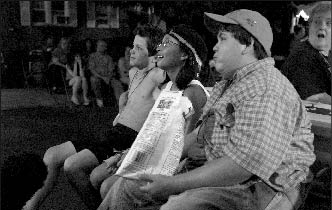Tween Tragedies
by George Sax

Several years ago, in his debut movie, L.I.E., Michael Cuesta undertook to portray a pederast—or, at least, a pursuer of adolescent males—with measures of understanding and sympathy. His boy-lover didn’t escape a kind of retribution, although the movie hinted it was injustice, but Cuesta’s efforts weren’t bent to presenting a monster.
In his second film, 12 and Holding, there are certainly no monsters and sympathy for his characters abounds. There are also reprisals, however, and monstrous consequences.
Cuesta’s three central characters are 12-year-olds—two boys and a girl—who are friends and neighbors in what seems to be a small, older suburban, geographically indeterminate town. Initially, there are four, but early on a boy, the twin of one of the other two, dies because of childish bullying and a feud that escalates into terror and tragedy.
Jacob, the surviving twin (Conor Donovan), experiences hatred, guilt and self-recrimination because he hadn’t been at the scene of the crime. He was already ill-at-ease with himself and his family because of a large red birthmark on his face, because he lacked his brother’s confident competence and brio and because he feels less admired by his now-distraught parents.
Surprisingly enough, Cuesta doesn’t concentrate on Jacob’s ordeal. He also focuses on Leonard (Jesse Camacho), who is suffering a more-than-usual identity challenge. He was there when Jacob’s brother died and was also injured, left with no sense of taste after striking his head on the ground.
This turns out to usher in an epiphanic experience. The overweight Leonard is told by his school’s gym coach that he is the most out-of-shape kid he’s ever seen and encouraged to do something about it. Leonard begins a regime of little food—which he can’t taste anyway—and exercise. Eventually, Leonard goes to bizarre extremes in this reclamation project, but he is still the most rational and brave of the trio.
Then there is Malee (Zoe Weizenbaum), the half-Asian girl whose father has literally and emotionally abandoned her and her psychotherapist mother (Annabella Sciorra). Unsettingly advanced for her age, she goes looking for inappropriate love with a spiritually damaged patient of her mother’s (Jeremy Renner).
Cuesta’s management of these three stories isn’t unimpressive, but where he has failed, I think, is in introducing the contrived excesses to which he submits his young protagonists, most particularly Jacob. Each ventures into dangerous territory, figuratively and literally, in the sway of very youthful obsessions. One may grant Cuesta, and his screenwriter Anthony Cipriano, some license to overdraw Leonard and Malee’s thoughts and reactions, but they take Jacob’s adventure in a direction that is not just startling, but coldblooded and frightening. The resolution of this story becomes the movie’s as well, which only aggravates its distasteful quality. The film becomes dramatically and emotionally hypertrophied. The results are even more inordinate since, for much of its length, 12 has basically functioned as a kind of sorrow-infected comedy.
In L.I.E., Cuesta imposed an extreme “solution” to his narrative challenges, but it didn’t seem arbitrary. Here he exhibits problems of aesthetic tone and self-control. 12 betrays the sympathy and interest it has encouraged.
|
Issue Navigation> Issue Index > v5n24: Crossing the Line (6/15/06) > Film Reviews > Tween Tragedies This Week's Issue • Artvoice Daily • Artvoice TV • Events Calendar • Classifieds |









 Current Issue
Current Issue